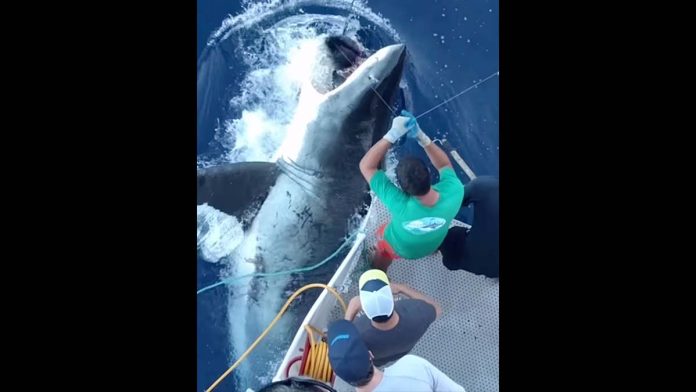There’s a reason ocean fishermen call sharks “the tax men.” And it is tax season, after all. A group of Stanford researchers recently were in for a massive—literally—surprise while on a recent ocean excursion. The team led by neuroscientist Dr. Andrew Huberman was on an expedition with Michael Muller to collect footage of great white sharks for a virtual reality project about fear. But they collected their most intense footage unintentionally.
“We wanted tuna for our dinner, and we had one on the line,” wrote Huberman in an Instagram post. “We were expecting a meal. A local great white reminded us that when they are around, humans eat last. However, the reward of seeing it breach was greater than the meal we would’ve had.”
If I was on the boat, I don’t know if I would have called the experience a “reward,” but it is quite the sight to behold. The footage shows a deck mate hand-lining a last bit of fishing line in—and then a gigantic great white shark lurching out of the water inches from his hands with what appears to be a sizeable bluefin tuna in its jaws. The video concludes with the shark thrashing the water and eating the tuna as the folks on the boat look on helplessly. See it for yourself below.
“Being in pursuit of something and especially, being right on the cusp of obtaining a reward is a very strong stimulus for dopamine release in the brain. But perhaps the greatest stimulus of all for dopamine release is when that is followed by positive surprise,” explained Huberman, who did not disclose the location of the incident. “I’ll also never forget that incident because when we get a big and unexpected release of dopamine, it leaves an indelible mark on our memory.”
Read Next: Watch a Pack of False Killer Whales Devour a Marlin as It’s Being Reeled In
I’ll just add that if a great white shark ever surprises me, I hope I’m safe aboard a boat much bigger than the one Huberman was on. According to Oceana, great whites can grow to 20 feet long and weigh over 6,000 pounds. They’re responsible for the majority of shark attacks on humans, according to the International Shark Attack File.








